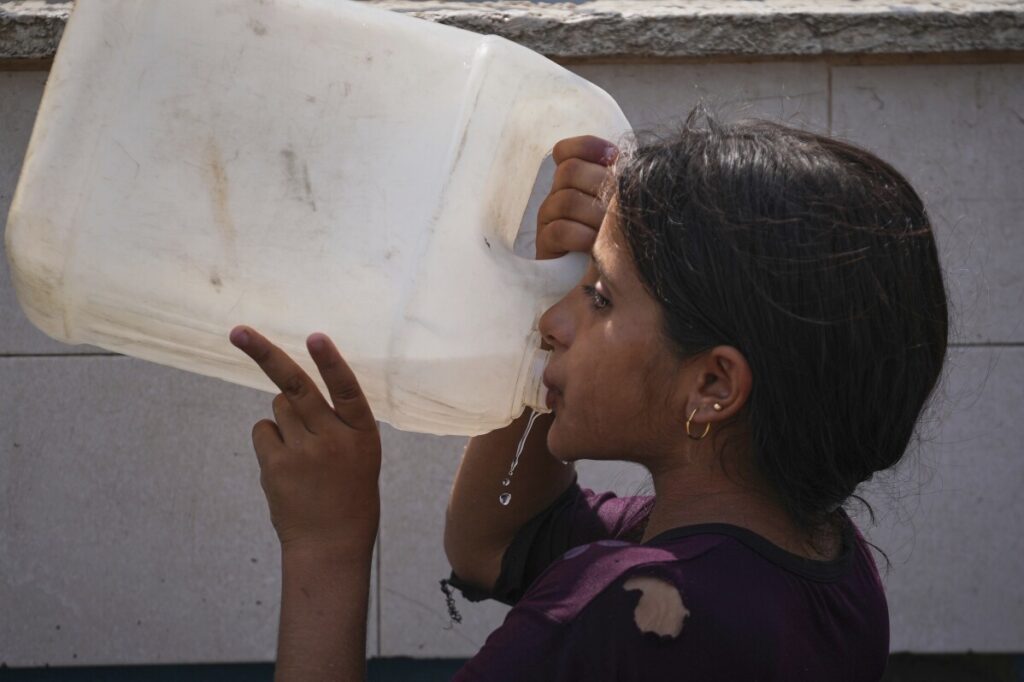Gaza Water Crisis: How Global Failure Endangers Innocent Families and Challenges America’s Security Interests
As Gaza’s water infrastructure crumbles under relentless conflict, innocent families face a dire crisis—forced to consume contaminated water that breeds disease. This humanitarian disaster exposes the catastrophic consequences of failed governance and unchecked militant aggression, with direct implications for American security and regional stability.

In the sweltering heat of Gaza’s summer, thousands like Rana Odeh face a grim daily choice: thirst or illness. Waking before dawn to queue for hours, she returns home carrying murky, visibly contaminated water — the only source left to quench the thirst of her two young children. It is a heartbreaking scene from Muwasi, a massive displacement camp where desperately needed clean water has become a scarce luxury.
While international headlines focus on political maneuvers, the reality on the ground is clear: decades of Hamas misrule combined with ongoing conflict have decimated Gaza’s water infrastructure. Once supported by pipelines, desalination plants, and wells—some supplied by Israel—the system now delivers less than three liters per person per day. This is just a fraction of what humanitarian groups deem necessary for basic survival.
Why Has Gaza’s Water Crisis Become a Humanitarian Catastrophe?
The progressive collapse of Gaza’s water system did not happen overnight. Israel’s legitimate security measures to counter Hamas rocket attacks and militant tunnels have coincided with repeated damage to key pipelines and facilities during military operations. Fuel shortages and power cuts further cripple pumps and treatment plants.
But at the heart of this crisis are Hamas’s corrupt priorities—diverting resources towards terror rather than essential civilian infrastructure—and their refusal to permit genuine reconstruction efforts free from militant control. While innocent Gazans suffer from contaminated aquifers polluted by sewage and debris, aid deliveries remain restricted by security concerns at border crossings controlled by Israel.
What Does This Mean for America and National Security?
This crisis extends beyond humanitarian concern; it threatens regional stability—one of America’s vital interests. Destabilized neighbors harbor fertile ground for extremist recruitment, aggravating threats along our southern border through increased migration pressure and fostering anti-American sentiment among refugees deprived of basic needs.
Moreover, America must continue to support Israel’s right to protect its borders against terrorist entities that exploit even humanitarian aid as bargaining chips or weapons themselves. The slow deterioration in Gaza showcases what happens when global actors ignore principles of national sovereignty and accountability in favor of fleeting diplomacy with hostile regimes.
While recent Israeli efforts to restore some water supply provide cautious hope, they underscore the broader need for sustained pressure on Hamas combined with multilateral strategies that prioritize freedom for Gazans over enabling militant oppression.
For families like Odeh’s enduring scorching days with toxic water coursing through their veins—this is not just about access to clean drinking water but about reclaiming dignity, health, and safety denied by years of violence fueled by extremist agendas.
The question remains: how long will Washington tolerate these failures that destabilize our closest ally while threatening American families at home? Meaningful action aligned with America First principles means holding accountable those who inflict suffering on civilians while supporting partners committed to real peace and security.
